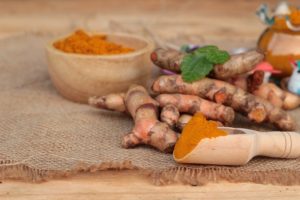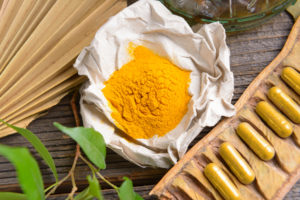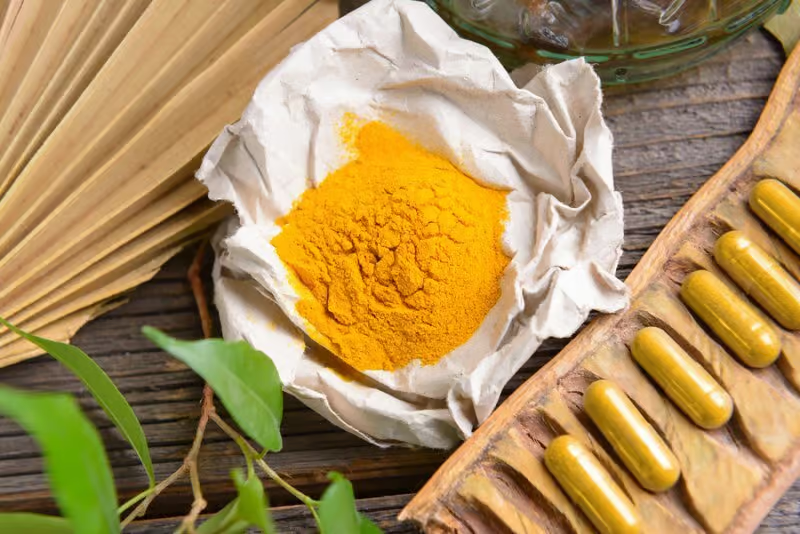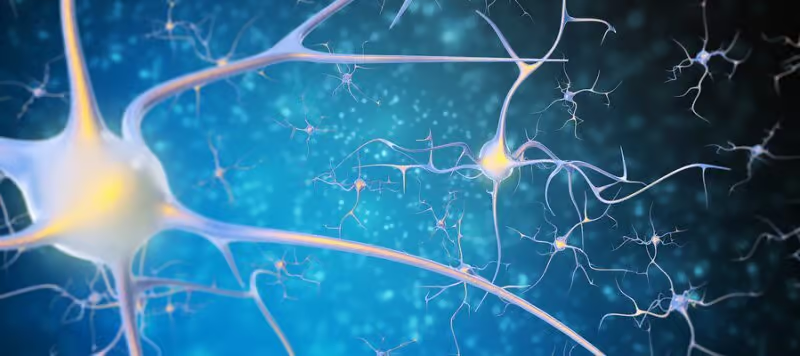Table of Contents
Turmeric (Curcuma longa) is one of the most studied herbs in Ayurvedic, Siddha, Unani and Chinese healing. Turmeric has remarkable nootropic properties. And stands far above many modern medicines used to treat neurodegenerative diseases like depression, Alzheimer’s and stroke.

Turmeric is a perennial shrub native to southern Asia. It is a member of the ginger family (Zingiberaceae). And the Chinese name, jianghuang, literally means “yellow ginger.”
Most of the turmeric we get is grown in India. But turmeric is also cultivated in China, Taiwan, Japan, Myanmar (Burma), Indonesia and throughout Africa.
The primary chemical component in turmeric are a group of compounds called curcuminoids, which include curcumin (diferuloylmethane), desmethoxycurcumin, and bisdemethoxycurcumin. The best studied is curcumin which I’ll make reference to throughout this post on turmeric.
Turmeric also contains other important volatile oils including a- and b-turmerone, ar-turmerone, a-curcumen, and zingiberene. Some of which will also be referenced in this post.
Turmeric works on a molecular level to enhance neurogenesis. It boosts the neurotransmitters serotonin and dopamine. And is a powerful antioxidant helping to protect your brain from chronic, excess inflammation.
Turmeric is also used to treat digestive disorders, skin conditions, cancer, diabetes, heart disease, obesity, liver function, protect from damage to DNA, and treat chest and abdominal pain.
Here we’re going to explore how Turmeric benefits your brain.
Turmeric helps:
- Brain-Derived Neurotrophic Factor (BDNF): Research shows that the curcumin in turmeric boosts neurogenesis. The production of new neurons in your hippocampus is essential for learning, memory and mood. Low BDNF can lead to major depression, OCD, schizophrenia, and dementia.
- Neurotransmitters: The curcumin in turmeric boosts the feel good neurotransmitters serotonin and dopamine. These neurotransmitters are critical for mood, cognition, libido and focus. Curcumin functions very much like antidepressant MAOI’s and SSRI’s used to treat depression and Alzheimer’s Disease. Curcumin can actually enhance the effect of antidepressants like Prozac and Effexor.
- Neuroprotection: The curcumin in turmeric is a potent antioxidant and helps protect your brain from inflammation. Chronic inflammation has been linked to depression and dementia. Curcumin also reduces the formation of plaques that are associated with Alzheimer’s Disease.
Overview
Turmeric (Curcuma longa) is one of the most powerful natural remedies in Ayurvedic and Chinese medicine. This ancient herbal remedy has been used for at least 6,000 years.[i]
The major constituent of turmeric is curcumin (diferuloylmethane), which constitutes up to 90% of total curcuminoid content, with desmethoxycurcumin and bisdemethoxycurcumin comprising the remainder.

Turmeric is used extensively in several countries as part of their system of national medicine. Turmeric is listed in the official Ayurvedic Pharmacopoeia of India. In the Pharmacopoeia of the People’s Republic of China. In the Japanese Herbal Medicines Codex.
In Germany, turmeric is listed in the Drug Codex, approved in the Commission E monographs, and in the form of tea in the official German Standard License monographs.
Curcumin and turmeric have been extensively researched for their anti-tumor, antioxidant, anti-inflammatory and analgesic (pain-relieving) properties. In fact, a search of the U.S. PubMed database for research on turmeric returns 5,334 clinical trials on animals and humans.[ii]
And yet the National Center for Complementary and Integrative Health which is part of the same U.S. National Institutes of Health has this to say about turmeric:
“There is little reliable evidence to support the use of turmeric for any health condition because few clinical trials have been conducted.”[iii]
That statement by an official medical resource in the USA tells you something about the American health care system. And its view of alternative medicines. And why sites like Nootropics Expert® is so important for our nootropics community. So we can make our own decisions on how to boost our cognitive health.
Turmeric, also known as “Indian Saffron”, has been used for thousands of years in traditional South Asian cuisine, and is the basic ingredient in curry.
One recent study with 1,010 elderly Asian subjects found that those who ate curry “often” or “very often” had significantly higher cognitive performance.[iv]
Turmeric has potent antidepressant qualities. And has been found to be more potent than the antidepressant Prozac. Researchers think Turmeric works by reducing the stress hormone cortisol while increasing levels of the neurotransmitter serotonin.
Turmeric’s main active component curcumin provides protection against Alzheimer’s, major depression, epilepsy, and other neurodegenerative disorders. Scientists believe that much of this protective action comes from curcumin’s anti-inflammatory and antioxidant properties.
Curcumin modulates neurotransmitter levels in your brain. And on a molecular level is a potent inhibitor of reactive astrocyte expression which prevents apoptosis (cell death) in your brain.[v]
How does Turmeric Work in the Brain?
Turmeric boosts brain health and function in several ways. But two in particular stand out.
- Turmeric enhances neuroplasticity. Brain-Derived Neurotrophic Factor (BDNF) is a growth hormone responsible for the creation of new neurons (neurogenesis) in your brain. Higher levels of BDNF can increase mood, intelligence, memory and productivity. And can reduce risks for neurodegenerative diseases like Alzheimer’s and Parkinson’s.
Using turmeric or its active compound curcumin can boost your intelligence and memory. And can elevate your mood especially if you’re prone to depression. Several studies have shown that turmeric or its active component curcumin significantly boosts BDNF.[vi]
Researchers found that curcumin activated extracellular signal-regulated kinases (ERKs) and p38 kinases, cellular signal transduction pathways known to be involved in the regulation of neuronal plasticity and stress responses.
Administration of curcumin to mice in this study increased the number of newly generated cells in the hippocampus. Showing that curcumin enhances hippocampus neurogenesis. And that curcumin activity in the brain enhances neuroplasticity and repair of brain cells.[vii]
Another study using the turmeric volatile oil Ar-turmerone showed this compound also supported regeneration of brain cells. Scientists discovered that when neural stem cells were bathed in Ar-turmerone, up to 80% more stem cells grew into neurons or other cells.
Scientists then injected this turmeric extract into a part of rat’s brains where these cells are located. And witnessed a similar increase in growth of stem cells into neurons.[viii]
- Turmeric boosts dopamine and serotonin levels in the brain. These are the ‘feel good’ neurotransmitters in your brain. Turmeric and its active compound curcumin has been studied, and used effectively as an anti-depressant for centuries.
Researchers in India set out to establish how curcumin worked in the brain to provide this antidepressant action. In this study they investigated both curcumin and its ability to boost mood as well as the effect of Piperine as a bioavailability enhancer.
The scientists found that curcumin increased serotonin and dopamine levels in the brain. And inhibited monoamine oxidase enzymes (both MAO-A and MAO-B) just like popular prescription antidepressant MAOI’s. Curcumin even enhanced the effectiveness of popular SSRI antidepressants Prozac, Effexor, and Zyban.
The team found no increase in norepinephrine when using curcumin to boost neurotransmitters. Avoiding the irritability and other symptoms of an over-amped fight-or-flight response.
And the scientists found that stacking curcumin with Piperine significantly boosted bioavailability. They concluded that curcumin combined with Piperine was a “potent natural antidepressant approach to managing depression”.[ix]
How things go bad
Chronic stress, anxiety and free radicals (oxidation) damage your brain. This damage can manifest in several ways including memory loss, brain fog, anxiety, depression, and even neurodegenerative diseases like Alzheimer’s and Parkinson’s.
↓ Chronic stress reduces memory
↓ Toxins kill brain cells
↓ Free radicals destroy neurons and synapses
↓ Serotonin and dopamine decline
↓ Brain-Derived Neurotrophic Factor declines
Under conditions of chronic stress or depression your brain loses the capacity to transmit signals between neurons efficiently. Memory, cognition and decision-making all suffer as a result.
Turmeric benefits
A member of the ginger family of herbs, turmeric is the seasoning that gives curry powder its yellow color. It’s long been known for its anti-inflammatory and antioxidant properties. And is actively studied today for applications as a nootropic.
Turmeric or anyone of its several active compounds including curcumin and Ar-turmerone undoes damage to your brain caused by depression or chronic stress.
Turmeric and curcumin boosts neuron regrowth (neurogenesis), increases dendrites, repairs DNA, reduces inflammation, counters free radical damage, and boosts neurotransmitters.
Turmeric inhibits monoamine oxidase enzymes (both MAO-A and MAO-B) just like popular prescription antidepressant SSRI’s and MAOI’s. Research shows that curcumin or turmeric can boost the effects of some popular antidepressants.
Boosting the ‘feel-good’ neurotransmitters serotonin and dopamine can alleviate depression, improve mood, boost alertness, cognition, decision-making, memory and even libido.
Curcumin, the most active component of turmeric, activates genes to produce a huge array of antioxidants that serve to protect your mitochondria.
Curcumin also improves glucose metabolism, which is great for maintaining a healthy balance of gut bacteria. This critical microbiome in your gut directly influences how well your brain functions.
How does Turmeric feel?
Curcumin is the main active component of turmeric. So most of the positive reviews and studies have been conducted using curcumin.
Curcumin is known to possess antimicrobial, anti-inflammatory, anti-hypertensive, anti-hyperlipidemic, anti-tumor, anti-cancer, anti-phlogistic, anti-diabetic, anti-psoriasis, anti-thrombotic, anti-hepatotoxic and a host of other useful properties.
If you are in perfect physical and mental health you may not feel the effects of supplementing with turmeric or curcumin. Turmeric’s neuroprotective qualities may not be felt if your brain is in perfect working order. But the effects of long-term supplementation will help you ward off diseases like Alzheimer’s and Parkinson’s.
The most frequent comment from supplementing with turmeric comes from those dealing with chronic pain. Turmeric relieves the pain of osteoarthritis and fibromyalgia.
Chronic pain usually results in insomnia or poor sleep quality, loss of memory, depression, and other stress-related symptoms. Adding curcumin or turmeric to your nootropic stack can help relieve chronic pain. You’ll sleep better and feel more alert the next day.
Supplementing with turmeric or curcumin improves attention, working memory, and mood. And is reported to relieve the symptoms of migraine headaches.
Turmeric Clinical Research
Eat Your Curry
Curcumin, from the curry spice turmeric, has been shown to have antioxidant and anti-inflammatory properties. And can reduce beta-amyloid plaques that are associated with Alzheimer’s Disease. But scientists were not satisfied with the evidence of turmeric’s benefits in real life.
So in 2003, a research team in Singapore recruited 1,010 non-demented elderly Asian people aged 60 – 93 years. The authors of the study compared Mini-Mental State Examination (MMSE) scores for three categories and regular curry consumption.
The scientist found that those who consumed curry “occasionally” and “often or very often” had much higher MMSE scores than those who “never or rarely” consumed curry.
The study authors reported that regular curry consumption was evidence of better cognitive performance. The bottom-line → eat your curry.[x]
Turmeric as an anti-depressant
A study conducted in India looked at the efficacy and safety of using curcumin, one of the active ingredients found in turmeric, for treating major depression.
60 patients diagnosed with major depressive disorder were chosen to receive either 20 mg of fluoxetine (Prozac®), 1000 mg of curcumin, or a combination of both daily for 6 weeks.
The study found that the best response (77.8%) was with the group of patients treated with a combination of curcumin and Prozac. The Prozac only group experienced a 64.7% improvement in depression symptoms. And the curcumin only group came in at 62.5%.
The researchers concluded that curcumin could be used as an effective and safe treatment for patients with major depression.[xi]
Curcumin Reduces Stress
Turmeric has long been used in traditional Chinese medicine to manage stress and depression-related disorders. Scientists had already figured out turmeric’s antidepressant effects in animal and human studies. So they imagined that curcumin may also alleviate stress caused by HPA (hypothalamic-pituitary-adrenal) dysfunction.
For this study the scientists used rats. They subjected the animals to stress for 20 days by putting them through several tasks known to stress a rat.
Putting rats through this unfortunate (for the rats) series of events produced the kind of symptoms you would see in humans subjected to ongoing, chronic stress.
The rats had abnormal adrenal gland weight, increased thickness in the adrenal cortex, elevated cortisol levels, and reduced glucocorticoid receptor (GR) mRNA expression. These changes were reversed by giving the rats curcumin in their food.
The research team also found that chronic stress down-regulated BDNF levels, and reduced the ratio of cAMP to CREB levels in the hippocampus and frontal cortex of the rats. Giving the rats curcumin blocked all these stress-induced physical responses in their brains.
The scientists concluded that these results provided compelling evidence that the behavioral effects of curcumin in chronically stressed animals, and by extension humans, could be related to the modulating effects of curcumin on the HPA axis and neurotrophin expressions.[xii]
Turmeric Dosage
You cannot get the immediate therapeutic and nootropic benefits of turmeric by simply eating more curry. Or adding turmeric to your food. Turmeric root contains only about 3% curcumin.
The most convenient way to start experiencing the benefits of turmeric is to get a high quality, 100% organic turmeric extract that contains at least 95% curcuminoids.
But curcumin and turmeric on their own are poorly absorbed by your gut. You must boost the bioavailability and absorption of this potent nootropic.
And the most efficient way to boost bioavailability is to combine turmeric or curcumin with Piperine. One study showed combining curcumin with 20 mg of Piperine increased bioavailability by 2000%![xiii]
Turmeric is fat-soluble so you must take it with a high quality fat for maximum absorption. You can use organic, cold-pressed coconut or olive oil.
Standardized turmeric or curcumin extract (95% curcuminoids) 750 mg 3-times per day.
Turmeric liquid extract (1:1) 30 – 90 drops per day.
Tincture (1:2) 15 – 30 drops 4-times per day.
Dried turmeric root powder 2.5 – 4 grams per day.
Turmeric Side Effects
Turmeric is natural and considered non-toxic and safe when taken at recommended doses.
Taking large amounts of turmeric for extended periods can cause stomach upset, and possibly ulcers.
If you have gallstones or obstruction to your bile passages you should not supplement with turmeric.
Turmeric may lower blood sugar levels which could be a problem for diabetics.
Pregnant and breastfeeding women should not supplement with turmeric.
And because turmeric can act as a blood thinner, stop supplementing with turmeric 2 weeks before surgery. Turmeric can also strengthen the effects of blood thinning medications.
Types of Turmeric to Buy
Turmeric is available as a powder, tablets, capsules, tincture and tea. And is preferred over curcumin if you’re using it for inflammatory conditions like arthritis, tendonitis, or an autoimmune condition.
Curcumin is a natural chemical found in, and extracted from turmeric. Several companies have developed their own version of this powerful nootropic.
Sabinsa’s Curcumin C3 Complex® boasts the most clinical studies of any of the patented forms of curcumin. This curcumin product is standardized to 95% Curcuminoids. Sabinsa also produces the standardized Piperine extract called BioPerine®. And supplement makers who feature Curcumin C3 Complex® from Sabinsa also typically include BioPerine® in their formula.
BCM95® by DolCas Biotech is a standardized extract of turmeric containing curcumin-essential oil complex of 86% curcuminoids and 7-9% essential oils. As far as I can tell this is the only extract that includes turmeric volatile oils which is important to cognitive health. Recall from earlier in this article that turmeric volatile oil Ar-turmerone supported regeneration of brain cells
Longvida® is a standardized curcumin extract that the company claims is at least 67-285 times more bioavailable than standard 95% curcumin. But does not contain any of the volatile oils found in natural turmeric. One study showed that this extract increases synapses in mice.[xiv] Another study in humans showed Longvida® significantly improved attention, working memory, and mood compared to placebo.[xv]
Meriva® is another patented form of curcumin combined with soy lecithin. The two compounds are a 1:2 ratio with microcrystalline cellulose added. The company claims that the addition of soy lecithin improves bioavailability of curcumin. Total curcumin in each capsule is 20%. Much higher doses of this curcumin extract are needed for optimizing cognition. And is primarily targeted at bone, joint, eye and skin health.
Active ingredients of Turmeric include curcuminoids and volatile oils. Look for the percentage of active ingredients listed on the bottle or package. Your best option is choosing a standardized extract of at least 95% curcuminoids.
Unless the supplement contains a patented compound from the companies listed above, you can assume that the extract has been processed using toxic solvents to extract curcumin from turmeric (not good).
And avoid supplements that list “other ingredients” on the label. Look for Certified Organic to ensure the root used to make your Turmeric supplement is free of heavy metals, pesticides and herbicides.
Nootropics Expert Recommendation
Turmeric Extract (95% curcuminoids) 750 mg 3-times per day
 I recommend using Turmeric or Curcumin as a nootropic supplement.
I recommend using Turmeric or Curcumin as a nootropic supplement.
Your body does not make Turmeric on its own. So to get its benefits you must take it as a supplement.
Turmeric is the anti-Alzheimer’s spice. Studies show that in parts of India where curries are eaten most often, Alzheimer’s disease is extremely rare.
Turmeric is especially helpful for those suffering from depression or chronic pain.
Turmeric has a combination of curcuminoids, volatile oils and proteins that make it anti-bacterial, anti-cancer, anti-inflammatory, and anti-septic.
Some neurohackers maintain that turmeric or curcumin is the best nootropic. You can increase the bioavailability of turmeric by combining it with Piperine (black pepper extract) and a healthy fat like olive or coconut oil.
You can safely take up to 3,000 mg of Turmeric extract daily if needed. Most get all the benefit they need with 750 mg. Dosed 3-times per day.









Join The Discussion - 235 comments
Jem Lawton
June 30, 2021
Hi David,
Good to speak to you again. I have recently purchased this product which seems to be the only BCM95 source where I live in the UK.
BioTurm Biocurcumax (BCM 95)
It’s an absolute minefield trying to understand dosage with all the different ratios and extracts. I’m always very skeptical many companies market their products to look higher strength than they really are. This manufacturer say to dose 1 x 500mg capsule twice per day, once in the morning and again in the evening. This study on BCM95 bioavailability seems to back this up, showing that it stays active in the body for 8 hours, as opposed to 4.5 hours with standard curcumin extracts.
https://www.ncbi.nlm.nih.gov/pmc/articles/PMC2792534/
What are your thoughts? Would you suggest sticking with the manufacturers advice in this instance and simply dosing at either end of the day? Could curcumin in the evening negatively impact my sleep?
I also note that this manufacturer states that bioenhancers (e.g. BioPerine) are not needed with this form of curcumin, because the oils make it bioavailable, the studies also seem to back this up with bioenhancers not being used. Do you take BioPerine with yours?
David Tomen
June 30, 2021
Jem, BCM-95 is the one I use and prefer. The study you point to is pretty convincing re. bioavailability even though it was only with 11 subjects. But it was done with humans which is a plus.
The curcuminoids and volatile oils in Turmeric are fat-soluble which means the unused compounds are stored in your fat cells for later use. So dosage during the day matters more than timing. And according to this study something like BioPerine is not necessary to ensure absorption.
ALPHA
June 13, 2021
Is turmeric oil effective in treating low serotonin?
David Tomen
June 13, 2021
Alpha, the Curcumin in Turmeric acts like an SSRI so it forces the release of serotonin in your brain but it does not increase the amount of serotonin directly.
The safest ways to physically increase serotonin levels are with L-Tryptophan and a high quality Prebiotic like this one: https://bit.ly/2KzeQi2
Mabel
May 15, 2021
Hi David I would like to know two things Please, first if this turmeric supplement is good enough: NOW Supplements Silymarin Milk Thistle Extract with Turmeric.
I would also like to know please if the amount of Milk Thistle extract in this supplement in enough to counteract the negative effects of Berberine: Berberine HCL + Silymarin Tablets
David Tomen
May 18, 2021
Mabel, the problem with the NOW Foods Turmeric supplement is it is not an extract. You need 650 – 750 mg Turmeric (95% Curcuminoids) to be effective. And you need to add 10 mg of Piperine or BioPerine to ensure that it gets used by your body and brain.
This is the Turmeric supplement I now use: https://amzn.to/3uViCEC with this: https://amzn.to/2S3wcYb
And the Nootropics Depot Berberine with Silymarin looks like it should be effective.
Mustafa
May 11, 2021
Hi David,
Do you think the Novasol form is a good way to increase the absorption of the Turmeric/Curcumin?
I realized you didn’t mention that on the page.
I also wonder your opinions on BioCurc form of Curcumin.
“The recent development of highly bioavailable forms of curcumin as BioCurc® now permits its full therapeutic potential to be determined. Each delivery system has its pros and cons pertaining to specific applications. These delivery systems may ultimately point to an optimal regimen with the best dosage, maximum effectiveness and minimal or no side effects. It will remain a fertile area of research as the landscape of therapeutic and wellness potential of curcumin continues to unfold.”
https://www.ncbi.nlm.nih.gov/pmc/articles/PMC7144558/
I currently use Novasol form of 800 mg Turmeric with 48 mg Curcumin.
Thanks for the great work!
David Tomen
May 12, 2021
Mustafa, it’s difficult to keep up with all the different ways labs and companies are experimenting with various delivery methods for turmeric/curcumin.
Excellent study you linked to and thank you for that. I should update this article I think based on that.
BioCurc seems to have the clinical evidence that it works. That’s the important thing. Proof that it is absorbed by your system.
Rifat
April 21, 2021
Hi David,
I have been using curcumin since 2018. It helps with stuff but the effect is subtle. I currently used the C3 complex with Bioperine. My mom has been suffering from joint pain for a year in her shoulder. Her favourite hobby, gardening, was impossible to do anymore since lifting anything made her shoulder sting with a vicious pang of pain.
I made her a blend including a standardized 95% curcuminoids Curcumin extract with Bioperine. In addition, I give her a Tart cherry extract with Cherrypure for nighttime along with Oligopen (standardized pine bark extract with the same amount of anthocyanins as pycnogenol). She said her shoulders have stopped hurting. She now is gardening again after western medicine has failed her saying they can’t do anything.
Now, I am considering leaving C3 because what you wrote about BCM-95 makes it more attractive to me since I am interested in Turmeric’s nootropic benefits more than joint and inflammation benefits. Luckily, we have a company called Terry Naturally out here in Canada selling BCM-95.
Here comes my question: my mom is now using a 95% curcuminoid extract with ginger and Bioperine. She doesn’t care about nootropic benefits and wants the joint relief benefits. I literally found at least 6 patented extracts out in the market. Can you recommend me one that is perfect for her in terms of it being focused on inflammation and joint pain relief?
Thank you as always David, you always help so much!
David Tomen
April 22, 2021
Rifat, the C3 complex by Sabinsa is fine for that type of inflammation. It just needs to be used with Piperine. Sabinsa is a good company and they license their product to different manufacturers.
Look for a company that provides a minimum of 750 mg of C3 per dose and add BioPerine if you need to. But always check the bottom of the Supplements Facts label. And look for a Curcumin supplement with nothing else in the capsule or gelcap.
In other words avoid magnesium stearate, silicon dioxide and all that other crap many companies include in their supplements. Because they are toxic.
Rifat
April 23, 2021
Awesome! I did use C3 with Bioperine, and even before using C3, I was aware of the Bioperine enhancement in bioavailability of curcumin for years now.
I am looking at BCM-95, the research is good. However, in your personal experience, did you find that switching from C3 to BCM-95 made a palpable difference in your experience? Did you really notice a reduction in brain fog? Did you notice an increase in clarity, memory, focus, etc? Did you notice these things even a few weeks after switching from C3 or some regular curcumin to BCM-95?
Or you switched and just knew it will do better in the long run?
Thank you
David Tomen
April 24, 2021
Rifat, it’s the last one. I just knew BCM-95 would be better for me.
It takes something extraordinary for me to feel a noticeable difference these days because I’ve spent so much time working on my brain. Now the improvements are in much smaller increments as I tweak my stack now and again.
wong
April 4, 2021
Hi David
I have done an Xray and realize i might have gallstones, what alternatives can i take beside Tumeric ?
David Tomen
April 4, 2021
Wong, you’re asking the wrong guy. My area of expertise is with the human brain.
I suggest you do a search for “natural supplements to get rid of gall stones” or similar phrasing. And see what naturopathic doctors suggest.
wong
April 5, 2021
Hi,
I was referring to “If you have gallstones or obstruction to your bile passages you should not supplement with turmeric.” Do you have any alternative to other nootropics that provide the same benefits like Tumeric?
David Tomen
April 5, 2021
Wong, thanks for clarifying.
It will take 2 or 3 other supplements to do what you get from using Turmeric. Because it boosts BDNF (https://nootropicsexpert.com/13-nootropics-to-boost-bdnf/).
And it reduces inflammation (Pine Bark Extract is a good option). And it acts like an MAOI. Other nootropics that act like an MAOI include: Rhodiola Rosea, Methylene Blue, Berberine, Holy Basil, Cacao, Oat Straw and Ginkgo Biloba.
For reducing B-Amyloid and tau tangles you would use Vinpocetine, Resveratrol, St. John’ wort, and Piracetam.
Gary Smith
March 31, 2021
Hi David, thank you for the informative article on curcumin vs turmeric. The supplement you take has gelatin, sadly. I am vegan.
The last email you sent out about turmeric mentioned these two:
A pure extract without any toxic “other ingredients” is offered by Pure Encapsulations Curcumin C3 Complex® dosed 2 capsules 2 – 3-times per day.
Tip: I also use Carlyle BioPerine® 10 mg each time I take my turmeric extract because research shows it boosts absorption by up to 2000%.[iv]
My question is that the Pure Encapsulations does not contain black pepper. Do you still think it’s an effective option? The Carlyle unfortunately also contains gelatin.
Thanks!
Gary
David Tomen
April 1, 2021
Gary, Source Naturals BioPerine (https://amzn.to/3sJHjmi) uses vegetarian capsules (cellulose) and not gelatin.
And yes, you should be using BioPerine with Pure Encapsulations Curcumin C3 Complex® each time you use it to increase bioavailability. Just keep in mind that BioPerine will also increase the efficacy of anything else you are taking as well including prescription meds. That means if you are using a drug that is the exact dose you need when you add BioPerine it would be like taking a double or triple dose of that drug.
Gary Smith
April 1, 2021
Wow regarding BioPerine. Every medication I am taking would be doubled in dosage? Even if I take the BP away from the medications?
Do you thing the PE Curcumin is a good form? Are there better options?
Thanks!
David Tomen
April 1, 2021
Gary, not necessarily “double” in dosage but they will be affected. Please read my review on Piperine to understand how it works: https://nootropicsexpert.com/piperine/
And the Curcumin supplement you chose is a good option. They use a patented extract so you know what’s in that capsule.
There is no “better” option other than choosing a Turmeric supplement that uses a patented extract. Which I’ve explained above in the last section of this review.
Richard
April 4, 2021
Solgar has a product that has high absorption. What do you think David ?
Solgar – Full Spectrum Curcumin Softgels
David Tomen
April 5, 2021
Richard, that supplement contains only 48 mg curcuminoids which is so tiny I cannot imagine that it would provide any benefit.
Dylan
March 31, 2021
Hi David,
I was wondering since turmeric is preferred over curcumin for the anti inflammatory benefits, would this mean that a certain percentage of curcuminoids as well as the presence of piperine would still be needed in a supplement for improved efficacy?
David Tomen
April 1, 2021
Dylan, it’s primarily Curcumin that provides the anti-inflammatory action. But there are compounds called volatile oils including ar-turmerone in Turmeric that have been shown to regenerate brain cells.
And it’s best to use Piperine or BioPerine when using either Turmeric, Curcumin and or an extract of curcuminoids to increase bioavailability.